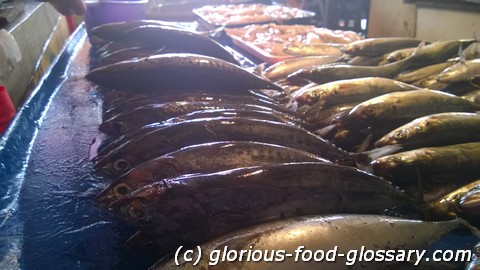Deutsch: Tangigue Fisch / Español: Pescado Tangigue / Português: Peixe Tangigue / Français: Poisson Tangigue / Italiano: Pesce Tangigue
Tangigue fish, also known as Spanish mackerel, is a sought-after seafood in various culinary traditions, especially in the Philippines and other parts of Southeast Asia. This species is renowned for its firm flesh and rich flavor, making it a favorite ingredient in a wide range of dishes, from grilled and fried preparations to soups and ceviches.
Description
Tangigue, a term more commonly used in the Philippines, refers to the Spanish mackerel (Scomberomorus commerson), a type of mackerel that inhabits tropical and subtropical waters, including the Western Pacific and the Indian Ocean. It is characterized by its elongated body, blue-green coloration on the back with silver sides, and a series of vertical stripes running along its body. The fish can grow quite large, making it a popular choice for communal meals and restaurant servings.
The appeal of tangigue lies in its versatility and the rich, slightly oily texture of its flesh, which remains moist and flavorful even after cooking. It is high in omega-3 fatty acids, making it not only a delicious but also a nutritious option for those looking to incorporate more seafood into their diet.
Application Areas
Tangigue fish is widely utilized in a variety of culinary contexts, demonstrating its versatility and broad appeal. In the Philippines, it is often served as kinilaw, which is similar to ceviche, where the fish is marinated in vinegar or citrus juices with onions, ginger, and chili peppers. It's also popularly grilled or fried and served with a soy sauce or vinegar-based dip. Beyond the Philippines, tangigue is appreciated in various forms of Asian and international cuisines, from raw preparations in sashimi to being featured in hearty seafood stews.
Well-Known Examples
One of the most famous preparations of tangigue fish in the Philippines is "Tangigue Kinilaw," a Filipino version of ceviche that showcases the fish's fresh, clean taste. Another notable dish is "Grilled Tangigue," often served with a side of garlic rice and atchara (pickled papaya), highlighting the fish's ability to pair well with a wide range of flavors and accompaniments.
Treatment and Risks
When consuming tangigue, or any seafood, it's essential to be mindful of its freshness due to the risk of foodborne illnesses. Fresh tangigue should have clear eyes, firm flesh, and a clean smell. It's also important to be aware of the environmental status of the Spanish mackerel populations, as overfishing and habitat loss can impact their sustainability. Consumers are encouraged to check for sustainability certifications or opt for seafood from responsible sources.
Recipes
Grilled Tangigue Recipe:
Ingredients:
- 2 large tangigue steaks
- 2 tablespoons soy sauce
- Juice of 1 lemon
- 1 tablespoon olive oil
- Salt and freshly ground black pepper
- 1 clove garlic, minced
- Lemon slices, for garnish
- Marinate the tangigue steaks in a mixture of soy sauce, lemon juice, olive oil, salt, pepper, and garlic for at least 30 minutes.
- Preheat the grill to medium-high heat.
- Grill the fish for about 5-7 minutes on each side or until the flesh is opaque and easily flakes with a fork.
- Serve hot, garnished with lemon slices.
Similar Terms or Synonyms
- Spanish mackerel: The international name for tangigue.
- King mackerel: Another term used in some regions, although it can refer to a different species in the same family.
Summary
Tangigue fish, known internationally as Spanish mackerel, is a highly valued seafood for its flavorful and nutritious flesh. It's versatile, featuring in a range of dishes from raw to fully cooked presentations, and is celebrated in various cuisines for its delicious taste and health benefits. As with all seafood, sustainability and freshness are crucial considerations when selecting and preparing tangigue.
--

Related Articles to the term 'Tangigue fish' | |
| 'Fanesca' | ■■■■■■■■ |
| Fanesca refers to a hearty soup that combines numerous beans, grains, and other vegetables cooked in . . . Read More | |
| 'Chowders' | ■■■■■■■■ |
| Chowders is a type of thick hearty soups are made from fish, shellfish and/or vegetables and often contain . . . Read More | |
| 'Tinapang Tamban' | ■■■■■■■■ |
| Tinapang Tamban refers to smoked Tamban, a type of small sardine-like fish that is widely consumed in . . . Read More | |
| 'Fish' at travel-glossary.com | ■■■■■■■■ |
| In the travel context, having fish as part of breakfast can be seen as a reflection of regional culinary . . . Read More | |
| 'Catfish' | ■■■■■■■■ |
| Catfish refers to a diverse group of ray-finned fish known for their prominent barbels, which resemble . . . Read More | |
| 'Snapper' | ■■■■■■■■ |
| Snapper is a type of fish that is highly valued for its firm texture and mild, sweet flavor. It is commonly . . . Read More | |
| 'Ilokano' | ■■■■■■■■ |
| Ilokano refers to both a group of people and a language in the northern Philippines. In the context of . . . Read More | |
| 'Tuna' at maritime-glossary.com | ■■■■■■■■ |
| Tuna in the maritime context refers to a group of large, fast-swimming fish species in the family Scombridae, . . . Read More | |
| 'Bisaya' | ■■■■■■■■ |
| Bisaya refers to a group of people and the language they speak in the Visayas region of the Philippines. . . . Read More | |
| 'Saging (Lakatan)' | ■■■■■■■■ |
| Saging (Lakatan) refers to a specific variety of banana that is popular in the Philippines and other . . . Read More | |
